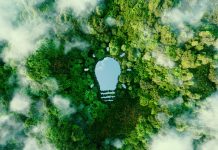Polymers & Biopolymers
Since World War II and with advances in chemistry, technological progress and the growth of material science, a new class of synthesised or manmade materials, called polymers or plastics, has been introduced. Due to their remarkable performances, polymers or plastics are everywhere in our world and used in everyday life in a wide range of applications such as food packaging, automobiles, electronics, building materials and furniture. In terms of properties, polymers are generally lighter than glass, metals or ceramics, can be rigid or flexible and, opaque or fully transparent. Most of the plastics used worldwide are still made from petroleum; a non-renewable resource. These petroleum-based polymers are extremely resistant to natural decomposition. Consequently and after using they accumulate and damage the environment and the ecosystem. The lack of biodegradability, environmental concern and the depletion of the oil have promoted worldwide research to develop biopolymers, bio-based and biodegradable polymers, as an alternative to petroleum-based plastics.
Biopolymers can be natural or synthesized from renewable resources. They can be extracted from biomass, such as polysaccharides from cellulose, produced from bio monomers using conventional chemical processes as polylactic acid, or directly in microorganisms as polyhydroxyalkanoates.
Challenges for biopolymers
Use of biopolymers brings additional challenges. Indeed, biopolymers exhibit lower end-use properties, crystallisation kinetics and processability than conventional polymers. Consequently, a major research effort is currently in progress to improve mechanical properties, crystallisation kinetics, and thermal resistance and barrier properties of biopolymers.
Research challenges
Our research activities at Sherbrooke University are mainly focused on i) understanding crystallisation and nucleation mechanisms of pure biopolymers such as PLA to find out the best bio-additives to improve crystallisation kinetics, ii) developing new surface treatments of natural fibre biopolymer-based bio-composites, and, iii) developing bio-nano-composites made of nanocrystals or nanofibers derived renewable resources or agricultural wastes.
i) Crystallisation of biopolymers
Poly (lactic acid) or PLA, is a biodegradable polymer that can be produced from renewable resources.
This biopolymer is regarded as the most promising bioplastic. As a result, it has raised particular attention as a potential replacement for petroleum-based polymers in many areas such as textiles, bottles, thermoformed containers, paper and cardboard coating. PLA has a low heat resistance unless it can be fully crystallised. However, PLA suffers from low crystallisation kinetics unless it is subjected to high orientations. Hence, increasing the crystallisation rate in processing techniques, such as injection moulding, where orientation levels are relatively low, is required to improve its thermal resistance. One way to improve the crystallisation kinetic is to found out a suitable bio-additives. However, understanding of nucleation and crystallisation mechanisms is required to optimise the crystallisation kinetics and subsequently to identify or develop the best bio-based additives.
ii) bio-composites: surface treatment of natural fibres
Naturally derived (i.e. not synthetic) and renewable materials are very intriguing in many applications because they are environmentally friendly, and naturally available. Among the renewable materials, natural fibres appear very intriguing for their high specific strength, compostability, and their low cost. These fibres have been used to reinforce composite materials used in structural and semi-structural industries as well as automotive industries. Natural fibres are also increasingly being used in bio-derived and bio-inspired materials.
Most of the plant natural fibres contain relatively high cellulose content (37- 78%). The cellulosic natural fibres are inherently hydrophilic and have a very poor interaction with most thermoplastic polymers. This results in the creation of weak interfaces between fibres and matrices in addition to non-uniformed dispersion of the fibres within the matrices.
Another drawback of using the fibres is the processing temperature of plant fibres which is less than 200° C. Natural fibres undergo degradation at a higher temperature, thus the polymeric matrices with processing temperatures above this critical temperature would become redundant. Moreover, the high moisture absorption of natural fibres can pave the way for swelling and formation of voids at the interface which leads to poor mechanical properties and so impairs the dimensional stability of the composites. Many attempts have been done to modify surface properties of natural fibres including physical, chemical, and Physico-chemical treatments but none of them is able to enhance the interfacial adhesion.
Our research focuses on trying to create interphase that can exhibit surface properties closer to those seen in the biopolymer matrix. In other words, we try to graft a nano-metric ceramic-based coating on natural fibres to enhance the properties in order to be used as reinforcements in biopolymer-based composites.
iii) Bio-nanocomposites: Bio-based nanocrystal or nanofibers as reinforcing nanoparticles
Similarly to natural-fibre-based biocomposites, we are, presently, trying to improve the performances of biopolymers by adding reinforcing bio-based nanomaterials. Among these bio-based nanomaterials, cellulose-based nanoparticles and nanocrystals seem to have promising potential as reinforcing biomaterials for biopolymers. Thus, we extract cellulose-based nanocrystals or nanofibers from renewable resources and, particularly, agricultural wastes and perform surface treatments of those nanocrystals and nano-fibres to improve their heat resistance, thermal stability and interfacial adhesion with biopolymers.
Prof. Said Elkoun
Director and Professor
Center of Innovative Technology and Ecodesign (CITÉ)
Sherbrooke University – Engineering faculty Mechanical engineering department
Tel: +1 819 821 8000 Ext: 65136
said.elkoun@usherbrooke.ca










